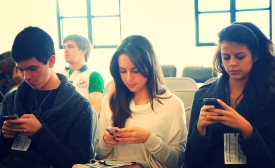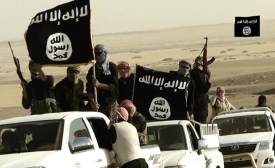Building the systems and structures to manage that, particularly in managing a potentially messy and dangerous confrontation in the Baltic states or South China Sea, is going to be a challenge. Other more subtle forms of communication -- unacknowledged direct telephone calls, messages delivered through spies, envoys and allies -- have also not gone away. But they will now be taking place at the same time as what could be frantic social media changes.
Social media has empowered isis recruiting, helping the group draw at least 30,000 foreign fighters, from some 100 countries, to the battlefields of Syria and Iraq. It has aided the seeding of new franchises in places ranging from Libya and Afghanistan to Nigeria and Bangladesh. It was the vehicle isis used to declare war on the United States...

From @Argentina to @Uruguay, states are discovering that their English-language Twitter handles let them join the digital discussion.
Social media is, of course, not the sole, or even the most important, cause of this failure. But we argue that social media challenges democratic consolidation by accelerating and intensifying dangerous trends such as polarization, fear and dehumanization of rivals. The speed, emotional intensity and echo-chamber qualities of social media content make those exposed to it experience more extreme reactions.
Egypt’s 2011 uprising has become synonymous with the successful use of social media to overthrow an entrenched authoritarian regime. Popular and academic literature hold it up as the paradigm of social media’s effects on contentious politics. Activists from Bahrain and Turkey to Ukraine and St. Louis learned and applied Egyptian protest tactics.

Challenging ISIS has little to do with decreasing their number of Twitter followers.
The United Nations Global Pulse initiative on Friday announced a partnership with Twitter that will provide the United Nations with access to the platform's data tools to support efforts to achieve the Sustainable Development Goals (SDGs) adopted by world leaders in September last year. [...] UN Global Pulse is an innovation initiative of UN Secretary-General Ban Ki-moon that harnesses data science and analytics for sustainable development and humanitarian action.

Operating in a diplomatic limbo and internal political struggle, what is Palestine's online strategy?







